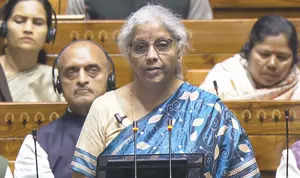
In a significant address to the Lok Sabha today, Finance Minister Nirmala Sitharaman presented the union interim budget 2024, outlining ambitious plans for economic growth and infrastructure development across various sectors. Sitharaman’s speech focused on key initiatives aimed at enhancing logistics efficiency, boosting connectivity, and promoting sustainable development.
Talking about the Railways sector, Sitharaman said that the government has outlined three major economic railway corridor programmes to be implemented across the country which include two port connectivity corridors and high traffic density corridors.
These projects, identified under the PM Gati Shakti initiative, aim to enhance logistics efficiency, reduce costs, and alleviate congestion in high-traffic corridors.
Focus on multimodal connectivity and logistics efficiency
Sitharaman highlighted the importance of improving multimodal connectivity through the implementation of energy corridors and port connectivity projects. She said these projects will improve logistics, efficiency, and reduce cost. “The resultant de congestion of the high traffic corridors will also help in improving operations of passenger trains, resulting in safety and higher travel speed for passengers,” she said.
By converting 40,000 normal railway bogies to Vande Bharat standards, the government seeks to enhance safety, convenience, and comfort for passengers while improving operations of passenger trains.
Galvanising the aviation sector
The Finance Minister also underscored the remarkable progress achieved in the aviation sector over the past decade, with the number of airports doubling to 149. Emphasising the expansion of end connectivity to tier two and tier three cities through the UDAN scheme, Sitharaman noted the widespread success of 517 new routes, catering to 1.3 crore passengers. Indian carriers have proactively placed orders for over 1,000 new aircraft, signalling a robust expansion trajectory for the industry.Sustainable urban mobility and renewable energy
Addressing the challenges of rapid urbanisation, Sitharaman highlighted the role of metro rail and e-mobility in fostering urban transformation. The government aims to support the expansion of metro systems in large cities, focusing on transit-oriented development and green energy solutions. Measures such as mobility gap funding for harnessing offshore wind energy and the establishment of coal gasification and liquefaction capacity by 2030 are envisaged to reduce imports and promote sustainable energy alternatives.
Blue Economy 2.0
Sitharaman unveiled plans for ‘Blue Economy 2.0’, aiming to promote climate-resilient activities and restoration of marine ecosystems. The scheme will focus on supporting climate-resilient activities and sustainable development initiatives in the maritime sector, furthering India’s commitment to environmental stewardship and sustainable growth.
Overall, Sitharaman’s budget speech outlined a comprehensive roadmap for economic growth, infrastructure development, and sustainable transformation, signalling the government’s efforts in fostering inclusive and sustainable development across various sectors of the economy.




